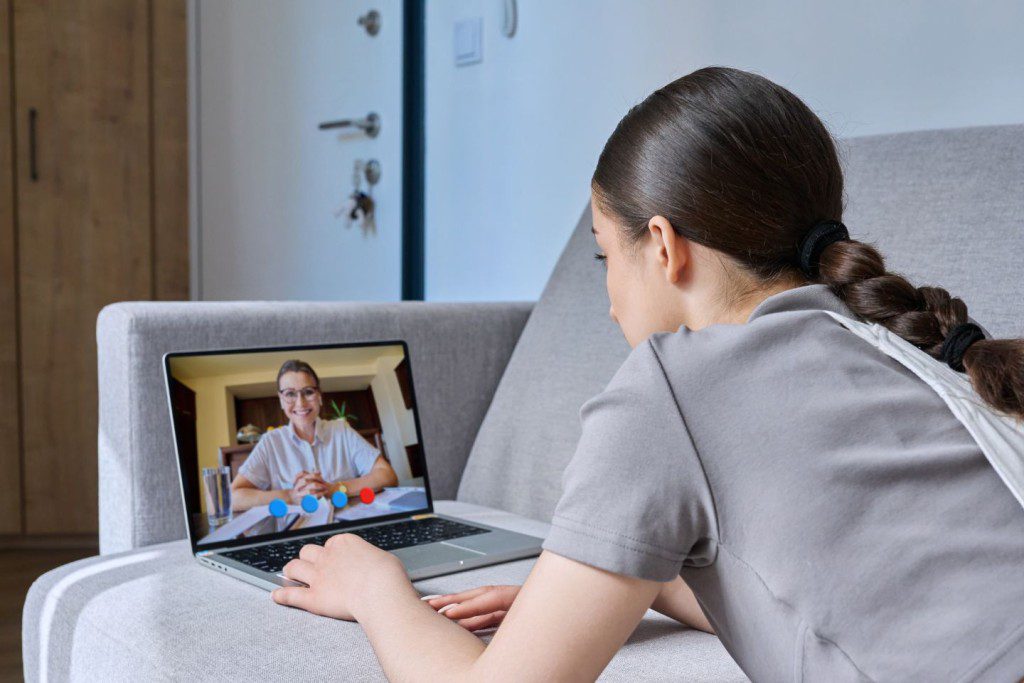News and Insights
Bridging the Gap in Youth Mental Health Care
July 29, 2024
We’ve all heard the saying: it takes a village to raise a child. And in many ways that has never been truer—or more necessary.
In June and July, we have been bringing you stories that detail the state of mental health and wellbeing among young people in America. First, we took deep dives into many of the challenges facing today’s kids, from the perspectives of FINN client experts in youth wellbeing and mental health.
Laura O’Neill, a partner in FINN’s Healthcare practice group, interviewed Laura Erickson-Schroth, M.D., M.A., and chief medical officer at The Jed Foundation (JED) about the stigma around talking about mental health. Jeremy Cesarec, a partner in FINN’s Education Practice, talked to Jeremy Glauser, CEO and Founder of eLuma, about the lack of healthcare resources in our schools and how that’s impacting student mental health.
The numerous issues confronting our kids is contributing to high rates of anxiety, depression and even suicidal ideation. In fact, according to JED, its 2022-2023 Healthy Minds study revealed that 14% of college students nationwide reported suicidal ideation, 6% reported making a suicide plan, and 2% reported a suicide attempt in the past year.
Technical Innovation Fills the Gap for Schools
Traditional talk therapy models, while effective, suffer from their inability to scale up to the size of the crisis. Alternative models are poised to become integral components of mental health support systems, addressing the youth mental health crisis head-on. For instance, one notable app underscores its effectiveness in providing accessible and confidential mental health assistance to students. Online and on-campus programs are also making significant strides, reporting lower rates of suicidal ideation, suicide planning and attempts, along with marked improvements in anxiety and depression scores. These scalable initiatives also contribute to decreased biases and preconceptions about mental health treatment, fostering a more supportive and open environment for youth wellbeing.

Rather than waiting for one all-encompassing solution to longstanding youth mental health challenges, organizations are providing a wide range of innovative options. If used responsibly and with students’ best interests in mind, technology can help overcome a shortfall of an estimated 100,000 mental health professionals in U.S. schools.
Providing virtual therapy from highly qualified clinicians
eLuma, an online provider that addresses mental health and special education intervention needs, focuses on online therapy from licensed clinicians. Just as virtual therapy has provided support to many adults who otherwise wouldn’t have access, eLuma helps districts do the same for K-12 students.
While eLuma has a long history of providing online special education support, the COVID pandemic prompted an expansion into universal mental health services.
“The lightbulb moment was probably based mostly on the volume of inquiries we received for mental health support,” said Jeremy Glauser, eLuma founder and board chairman. “We realized we needed to do something about it and do it fast.”
The overwhelming shortage of school-based mental health professionals and the increasing demand for their services impacts every type of school district. Small rural districts struggle with barriers like location and funding that affect talent acquisition and capacity building. Large urban districts are stretched thin, making it difficult to provide comprehensive student services that are easily tracked, documented and reported.

To support a wide range of district needs, eLuma offers an end-to-end service model, supporting their school partners by:
- Providing online assessment screening
- Carefully matching full-time virtual providers to school communities so they can serve as an extension of the school-based team
- Streamlining the management of student support services, such as scheduling and facilitating virtual therapy sessions, monitoring and reporting student progress against goals, and regulating compliance
Although eLuma leans into technology, they stress that innovation will never interfere with human impact. Instead, their virtual offerings make high-quality service accessible, practical and affordable. Their virtual solution augments other efforts to provide students with crucial resources. eLuma’s customer satisfaction rate of 92% suggests that they are living up to their mission, ensuring that they are one effective solution among many.
Always-On Support Built to Appeal to Today’s Tech-savvy Teens
It’s not enough to simply give students access to mental health support. They need to feel comfortable sharing their issues and concerns before they buy into an intervention and improvement plan.
Today’s teens’ preference for mental health support often surprises adults, who had different experiences and options at their age. Alongside, a mental health app that provides personalized prevention and early intervention to secondary school students, aligns with the modern teenager’s expectations.
Much like popular adult mental health apps, Alongside provides an AI-supported platform that students can turn to for in-the-moment support and intervention, offering:
- A chatbot (personified by a llama named Kiwi) and in-app resources created by a team of doctoral mental health experts and directly informed by evidenced-based clinical models
- “Teen-proof” chat conversations and activities created with input from teen interns
- Proprietary machine learning technology that swiftly identifies the student’s issue so that they’re naturally directed to participate in one of 80+ clinician-designed personalized chat modules
- Post-session action plans that encourage the student to complete a relevant activity from a library of in-app option promoting the development of critical social, emotional and behavioral skills
- The ability to detect and escalate severe issues that require immediate care, though they are often few and far between (to date, less than 1% of Alongside chat interactions required escalation)
Even in the best-resourced schools, students don’t have access to 24/7 mental health support. Teens consistently report that the Alongside app equips them to get immediate help in a private, confidential space, especially on topics they may not yet feel comfortable discussing with an adult.

Alongside recently released a study that analyzed anonymized data from over 30,000 confidential sessions teens held on the AI-powered app during the 2023-24 school year. The Pulling Back the Curtain on Youth Mental Health Report most notably showed that for over a third of chats (36%), students wanted to process feelings and feel heard. This outranked other session purposes like building a skill or receiving advice about a problem.
“Our findings clearly indicate that teens value a safe space to explore and process the world around them without judgment,” said Dr. Elsa Friis, head of mental health at Alongside. “Such a finding lays bare the simple importance of offering empathy and understanding as the foundation for providing support.”
Twenty-first century teens are accustomed to new modes of communication and are open to innovative mental health resources. As AI technology improves, expect more solutions to enter the K-12 market as part of the suite of school-based mental health supports tackling the youth mental health crisis.
Colleges Amp Up Mental Health Support for Students
JED is a nonprofit whose mission is to protect the emotional health of America’s teens and young adults and prevent suicide by equipping them with the skills and support they need to grow into healthy, thriving adults. JED works with approximately 440 colleges and universities who are participating in the JED Campus Program. Launched in 2013, JED Campus is a four-year, technical assistance program designed to make mental health a priority on every campus.
According to JED, when a college invests in the emotional health of its students, the results can be monumental. The campus can foster social connectedness, inclusivity and a strong sense of belonging among students. This climate can encourage students to seek help for themselves and others and identify and support those at risk for mental health issues. Colleges can offer comprehensive support services addressing mental health and substance use concerns, ensuring that students feel cared for and secure. Plus, colleges are instructed in how to regularly monitor and restrict access to lethal means, proactively minimizing environmental risks for suicide.

And it works. In a recent report evaluating a decade of the organization’s efforts—which reached an astonishing 5.6 million students—the results were clear: the study found a 40% increase in screening of students for depression, anxiety and suicidal ideation; a 51% increase in the number of campuses which report that emotional health is a campus-wide issue; and a 63% increase in the number of campuses which have conducted a scan of access to lethal means.
The study also found higher student flourishing scores, a measure of purpose, engagement and self-esteem. Students had improved anxiety and depression average scores and were more likely to stay in school and graduate.
Furthermore, students were 10% less likely to report suicidal ideation in the past year, 13% less likely to make suicide plans and 25% less likely to attempt suicide. Even more encouraging, students showed decreased preconceptions about mental health treatment.
Supporting Kids in an Increasingly Complex World
It can be easy to downplay the mental health challenges facing today’s children and young adults. They’ll outgrow it, we reassure ourselves. Things are so much safer now.
But are they?
We have examined youth mental health issues from a variety of angles, although there are so many more. From cyber-bullying to gun violence, climate change to political turmoil, economic uncertainty to discrimination, today’s kids have a lot to worry about. Organizations like JED, eLuma and Alongside are modern-day examples of the village, and they’re helping young people handle the effects of this very complicated existence.